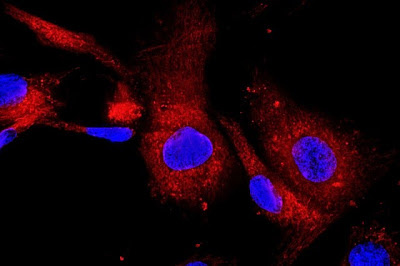The ability of adult stem cells to renew themselves decline as we
age, but researchers have discovered a small molecular drug that could
‘rejuvenate’ brain and muscle tissue. The study, published in the
journal Oncotarget,
successfully interrupted the activity of a growth factor in mice that
has been previously shown to affect a stem cell’s ability to regenerate.
Previous research has shown that molecular changes in a stem cell
microenvironment contributes to the tissues’ ability to repair damage
and maintain homeostasis.
Researchers found the transforming growth factor beta 1 (TGF-beta1)
pathway to play a significant role in the aging of multiple stem cells.
In the new study, researchers reduced TGF-beta1 activity by inserting
genetic blockers into the brains of old mice. The results found tissue
regeneration of stem cells to be ‘enhanced’ in old mice.
"Based on our earlier papers, the TGF-beta1 pathway seemed to be one
of the main culprits in multi-tissue aging," said co-author David
Schaffer, director of the Berkeley Stem Cell Center and a professor of
chemical and biomolecular engineering, in a statement. "That
one protein, when upregulated, ages multiple stem cells in distinct
organs, such as the brain, pancreas, heart and muscle. This is really
the first demonstration that we can find a drug that makes the key
TGF-beta1 pathway, which is elevated by aging, behave younger, thereby
rejuvenating multiple organ systems."
The research team injected a small molecule called Alk5 kinase
inhibitor, which is known to reduce the influence of TGF-beta1, into the
blood of old mice once a day for 11 days. Researchers found the small
molecule had ‘perked up’ the stem cells' ability to regenerate both
brain and muscle tissue in old mice.
Researchers hope this research could result in effective treatments
for combating multiple age-related degenerative disorders, which can
have a range of debilitating effects
"The challenge ahead is to carefully retune the various signaling
pathways in the stem cell environment, using a small number of
chemicals, so that we end up recalibrating the environment to be
youth-like," Conboy said. "Dosage is going to be the key to rejuvenating
the stem cell environment."

